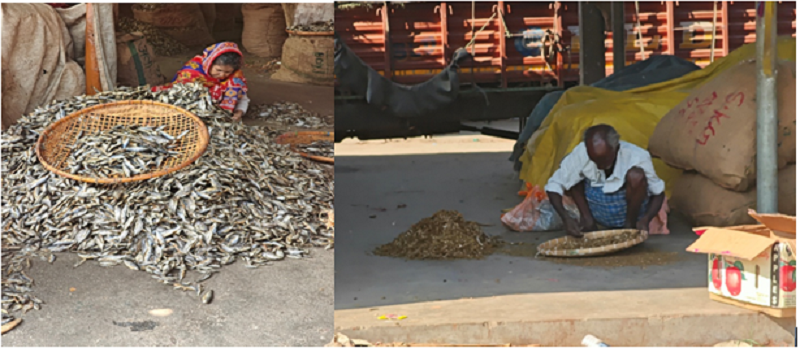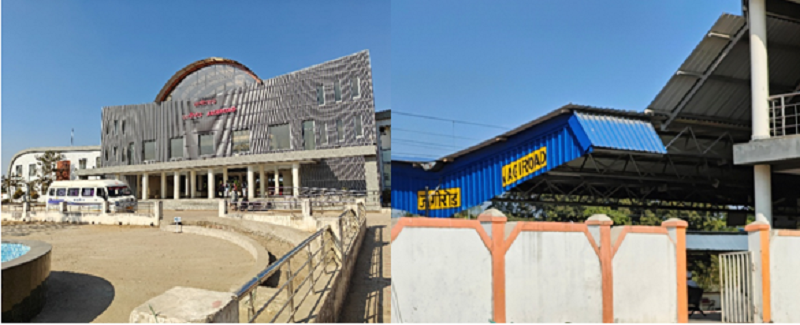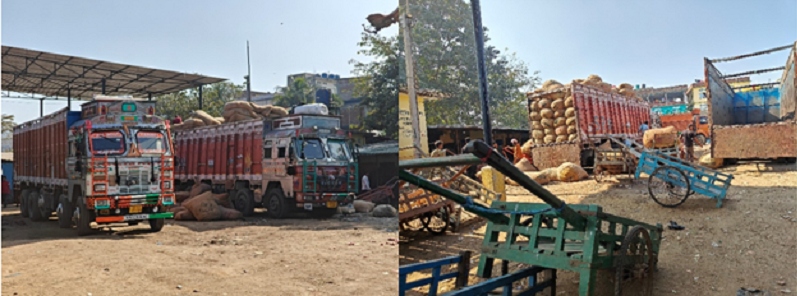Written by: Nazrul Haque & Amalendu Jyotishi
Just 55 kilometers east of Guwahati, the bustling town of Jagiroad in Assam’s Morigaon district pulses with a history as rich and layered as the flavors that permeate its air. Beyond its ancient roots as part of the Tiwa kingdom and its harmonious blend of diverse communities, Jagiroad holds a unique distinction: it is home to what is arguably Asia’s largest dried fish market, a sprawling 30-acre hub that fuels livelihoods and connects cultures across Northeast India and beyond.
Ready for a challenge? Click here to take our quiz and show off your knowledge!
The story of this remarkable market is inextricably linked to the legendary Jonbeel Mela, a historic fair held annually just three kilometers away in Dayang Belguri.
“This unique gathering, dating back to the 15th century during the Ahom dynasty, was established to foster trade between the hill tribes and the people of the plains. Even today, after the Magh Bihu festival in January, the barter system, though largely symbolic, is reenacted under the watchful eye of the Tiwa kings,” said Anil Boro, a local resident.
“Hill communities bring their organic produce – turmeric, ginger, medicinal herbs, and forest treasures – to exchange for rice, dried fish, salt, and other essentials from the plains. Many locals believe that the vibrant dried fish market of today has its origins deeply embedded in this age-old tradition of exchange,” he said.
Ready for a challenge? Click here to take our quiz and show off your knowledge!

Fish, in its preserved form, has long been a cornerstone of Assamese cuisine. Before refrigeration became commonplace, drying was a vital method of ensuring sustenance, particularly during lean seasons. Beyond mere preservation, certain small dried fish varieties form the base of unique and flavorful dishes across the northeastern states. Communities residing along the mighty Brahmaputra and its tributaries relied on this technique to build food reserves.
The enduring popularity of dishes like “sukuti,” dried fish simmered with vegetables and spices, speaks volumes about its cultural significance and sustained demand in both rural and urban households. The appeal extends beyond Assam’s borders, with ethnic communities like the Khasi, Garo, and Naga people also incorporating dried fish into their daily diets. As trade routes expanded, connecting Assam with Bengal and neighboring regions, dried fish solidified its position as a crucial commodity in the local and regional economic landscape.

Jagiroad’s own ascent from a small settlement to a significant economic center was accelerated during British colonial rule. Its strategic location along newly developed railway lines and road networks, initially designed to serve the burgeoning tea industry, inadvertently facilitated the movement of other goods, including the increasingly sought-after dried fish. The growing demand across Northeast India made Jagiroad an ideal nucleus for traders and fishermen to establish a permanent marketplace.
Notably, dried fish also became an important food source for the communities who migrated from the Chottanagpur region to work in the tea plantations, the ‘tea tribes’ comprising groups like the Orang, Munda, and Santhal. Jagiroad’s railway station became a key point not only for tea but also for the import of labor and essential commodities, particularly dried fish. Its position along National Highway 27 further cemented its connectivity to Guwahati and other major markets.

The town’s economic dynamism was further amplified with the establishment of the Nagaon Paper Mill in the late 20th century. “This industrial development triggered a significant demographic shift, drawing skilled and unskilled workers, engineers, and managerial staff from across India. People from Assam, West Bengal, Bihar, Uttar Pradesh, Odisha, and even distant states like Tamil Nadu and Kerala made Jagiroad their home, creating a tapestry of multi-ethnic neighborhoods,” said Dip Sharma, secretary of Jagiroad Dry Fish Market Association.
“This influx fostered a rich cultural exchange, influencing customs, traditions, and languages, and nurturing a strong sense of pluralism. Markets, restaurants, and places of worship catering to diverse communities blossomed, mirroring Jagiroad’s evolving multicultural identity,” he said.
It was within this vibrant socio-cultural milieu that the dried fish market formally took root in 1940. Today, it stands as a testament to Jagiroad’s enduring economic importance, a sprawling 30-acre expanse that supports approximately 4,000 individuals, including traders hailing from Uttar Pradesh, West Bengal, Gujarat, Andhra Pradesh, Bihar, and various parts of Assam itself.

The Jagiroad Dry Fish Market Association plays a pivotal role in the smooth functioning of this massive operation. This dedicated body oversees market practices, ensures fair pricing, and maintains crucial hygiene and quality standards in the processing and sale of the dried fish. It acts as a vital platform for addressing the concerns of traders and fostering the harmonious environment that characterizes both the market and the town of Jagiroad. The market’s ability to attract traders from diverse corners of the country and provide livelihoods to a significant local population underscores a culture of cooperation and mutual benefit, contributing to its continued success. Despite the emergence of similar markets elsewhere in the Northeast, both traders and buyers consistently gravitate towards the established infrastructure and vibrant atmosphere of the Jagiroad market.
“The market operates on a well-defined weekly cycle. The first two days witness a steady stream of trucks arriving, laden with dried fish sourced from across India. The subsequent two to three days are a flurry of activity as traders from various parts of Northeast India descend upon Jagiroad to procure their stock for resale. The final day of the week is dedicated to the essential tasks of accounting and administration, ensuring the financial backbone of this bustling trade,” said an office-bearer of the Market Association.

The sheer variety of fish available at the Jagiroad market is astounding, a testament to its extensive trade networks. “Sea fish, primarily sourced from the Gujarat and Mumbai regions, includes popular varieties like Bamla (Bombay duck), Chokia (dry hilsa), P & T (dried silver belly), Telas, and Kardi (dried shrimp), with Bamla being the highest traded. Freshwater fish, on the other hand, arrives from diverse markets including Lucknow (serving West, West Central, and Central India, and North Southern Nepal), Gorakhpur (Central and Southwest India, and Eastern Nepal), and Matigara and Siliguri (bringing in fish from Bihar, West Bengal, and Orissa),”he said.
Interestingly, freshwater fish also finds its way here from Bangladesh via Tripura or Karimganj. While Karnataka, Kerala, and Tamil Nadu are significant producers of dried fish, their products largely bypass Jagiroad, instead finding their primary market in Sri Lanka.
The processing and preservation methods employed at the market are crucial to maintaining the quality and extending the shelf life of the diverse fish stock.
“The primary techniques involve sun-drying, where fish are laid out to dehydrate naturally under the sun and wind, and smoking, which imparts a distinct flavor and aids in preservation. Following the drying process, the fish are meticulously sorted based on quality, size, and type,” Kodai Sahani, one of the oldest trader in the market, said.
Proper packaging ensures their protection during transportation to various markets. The market facilitates both wholesale, catering to larger traders, and retail, serving smaller vendors. Efficient storage facilities and well-established transportation networks are vital for the smooth distribution of this essential commodity.
The Jagiroad dried fish market stands as more than just a place of commerce; it is a vibrant artery in Assam’s economic and cultural landscape. Its well-organized trading system, the sheer diversity of fish it offers, and its deep historical roots solidify its position as a vital hub for both trade and cultural exchange. By preserving traditional drying techniques while embracing expanding trade networks, the market is poised for continued growth and development, ensuring its salty heart continues to beat strong for generations to come.
Nazrul Haque & Amalendu Jyotishi are faculty members at Azim Premji University, Bangalore. Views are personal.
